Thinking of creating an online course to get your start as an ecommerce entrepreneur?
If so, you have excellent timing. More and more people are turning to e-learning to expand their knowledge and improve different skills.
Online courses are one of the top digital products to sell and are a great way to earn money, either as your main activity or as a method for earning additional income on the side. Furthermore, anybody can develop an online course—in most cases, you don’t need to have formal training!
However, the subject of your web course will undoubtedly play an essential role in the future sales and overall success of your e-learning business. With the extensive array of options available, determining your niche can seem overwhelming at first glance.
In this article, we’ll explain how you can learn to narrow down your choices regarding what course topic is ideal for you as well as provide you with a list of some of the best-selling course niches and examples for inspiration!
Questions to ask yourself when deciding what kind of online course to sell
The niche you choose for your online course is obviously a very important decision for your e-learning business!
For this reason, as with any other online business ideas, it’s essential that you take your time when you decide to sell courses online as you brainstorm possible niches. Here are a few questions you can ask yourself to help you determine the right niche and launch your business as soon as possible.
What topic(s) do I have a lot of knowledge about?
To start, it’s imperative that you know a thing or two about what you plan teaching!
If people are going to shell out cash for an online course, they’re going to expect that the person teaching it is an expert. While you don’t need to know absolutely everything there is to know about a subject before creating a course on it, you should be comfortable discussing it at length and be willing to learn and keep yourself updated on any new developments concerning your chosen niche.
In addition, keep in mind that your knowledge can come from different sources. For example, you may have learned a lot about a specific topic through your professional experience. You might even be certified in a certain area, which can help boost your authority in terms of being able to teach a course. It’s also possible that you’ve developed extensive knowledge about something simply by enjoying it as a hobby.
What are my passions?
The next area to examine to help you determine the best idea for your online course is what you’re passionate about. When it comes to e-learning, simply having knowledge about a subject isn’t enough.
Sure, you’ll probably be able to create a decent online course concerning a topic you’re knowledgeable about but don’t love. However, your lack of passion will very likely become very clear to your students at some point, which can have a negative effect on their learning and therefore your sales.
Furthermore, being passionate about your course theme will allow you to build your brand and your business more effectively over the long term. The more excited you are about your chosen subject matter, the more you’ll be able to bring to the table in the form of informative and engaging lessons.
Is there a demand for my online course idea?
Finally, you’ll need to ask yourself if people are going to actually want to buy your online course. No matter how much you know about your subject and how passionate you are about it, your bottom line will suffer if there’s no demand for your product.
Feeling stumped as to how to determine whether there’s a real market for your course? As you research the possible demand for your idea, think about the following:
- Have you previously been approached to provide tips on the topic?
- Does your idea help solve a problem for consumers and/or fill a gap in the market?
- Would people pay to have access to your course information or could they find it elsewhere for free?
Don’t hesitate to ask your inner circle for their thoughts on your business idea or reach out to your followers on social media for their opinions. While validating your product can be a time-consuming, frustrating step, it’ll ultimately save you time, money, and effort in the long run, so don’t skip it!
What are the best-selling courses for an e-learning business?
While you’re of course at liberty to create an online course on any subject you’d like, it’s always helpful to know which topics are currently trending to see if you’re on the right track with your idea.
To help inspire you, here are 15 of the best-selling courses to consider creating!
1. Fitness
Fitness is essential not just for physical health but for mental health as well. It can help to relieve stress, provide better sleep, and boost your overall mood.
Though fitness has always been a favorite theme for web classes, it’s exploded in popularity since the start of the coronavirus pandemic. With lockdowns eliminating access to the gym for many people, the demand for online fitness classes increased significantly. While COVID-19 restrictions have decreased in many parts of the world, consumers still very much appreciate the convenience that online fitness programs have to offer.
A great thing about selling fitness courses is that the world is your oyster in terms of your content. Yoga, HIIT, ballet, boxing, tennis…you name it! There’s a type of workout out there for everybody.
Created by fitness influencer Joe Wicks, The Body Coach is an app with course content accessible via monthly, quarterly, or annual subscriptions. It provides members with weekly live, exclusive workouts for various levels of fitness; customized meal plans; and a planner to help users stay on track with their goals.
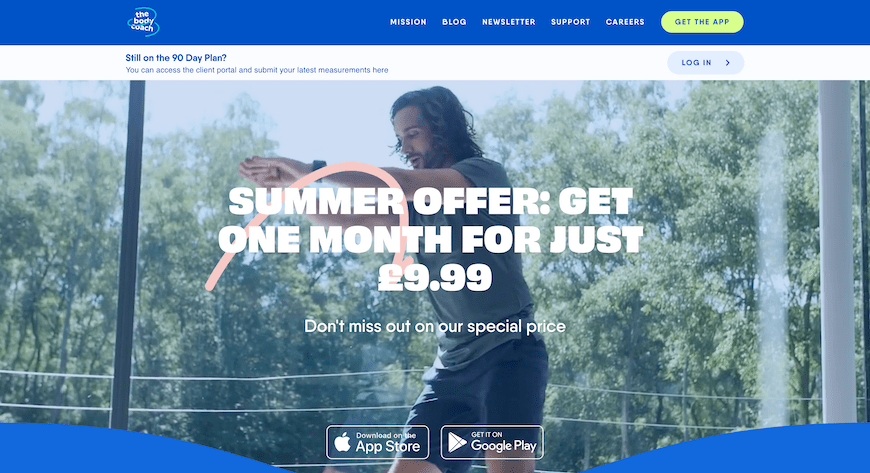
2. Personal finance
With many people re-evaluating their careers and finances after experiencing the volatility brought on by COVID-19, online courses involving personal finance and investing are quite popular at the moment.
If you’re knowledgeable about topics like budgeting, tax preparation, bitcoin and other kinds of cryptocurrency, the stock market, and real estate, consider making a course to help people become more confident with handling their finances.
Although being well versed in the topic in question is important for any online course you sell, it’s especially crucial when teaching people how to spend or manage their money. Obtaining special certifications will be particularly helpful for this kind of course, as they can boost trust in your product.
Note that while you can certainly make e-learning your main business activity, you can also offer free courses as a form of content marketing to spread awareness about your brand or to help promote your other products or services. In the example below, we see a selection of free personal finance courses from Clever Girl Finance, founded by Bola Sokunbi.

3. Cooking
People all over the world share a love of food—whether it entails preparing it, eating it, or both!
For all kinds of reasons, many people today lack the knowledge and/or confidence required to make their favorite meals. Creating an online course that assists them with feeling more adept in the kitchen is a great way to share your passion and experience for bringing a great recipe to life.
Furthermore, online courses involving the culinary arts offer lots of room for creativity and very specific niches, allowing you to better stand out from your competitors and grow your business. These courses can teach students everything from how to make dishes to accommodate special dietary requirements, prepare recipes revolving around a special type of cuisine (e.g., Italian food, Peruvian food, Japanese food, etc.), or even how to use common (or not-so-common) kitchen devices.
Fans of feisty celebrity chef Gordon Ramsay can enjoy learning some of his helpful cooking tips without having to fear facing his wrath if their culinary creations don’t meet his expectations by taking his cooking course on MasterClass.

4. Marketing
While many people have a desire to start their own business, not all of them have the marketing skills or knowledge required to get the word out about their venture and reach their intended audience. What’s more, a growing number of people are interested in becoming influencers and developing their personal brand. For this reason, online courses involving various areas of marketing, especially digital marketing, are some of the best selling.
Whether you opt to teach users about SEO, Google Analytics, social media, community management, blogging, paid advertising, or another marketing subject, there’s a good chance that you’d be able to find a significant audience for your courses. Web content consumption is likely to only increase in the future, so the demand for learning how to create high-quality content for online marketing is expected to grow as well.
A quick search on online course marketplace Udemy shows the vast array of available courses dealing with marketing, such as The Ultimate Digital Marketing Course 2022 by Joshua George. Keep in mind that things change quickly in marketing, so if you decide to sell a course related to this subject, you’ll probably need to revise your product regularly to avoid sharing outdated information.
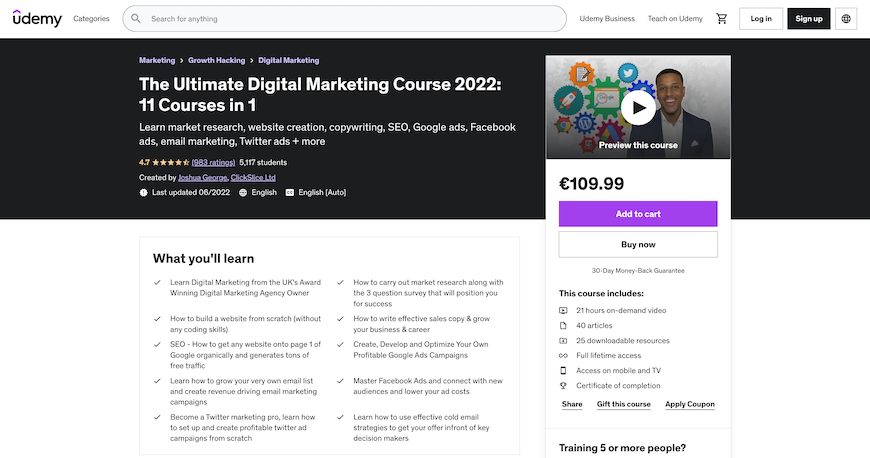
5. Arts and crafts
If you’re known for having a bit of artistic flair, help others express their creativity by teaching an online course on your favorite topic involving arts and crafts. The nice thing about selling an online course that teaches people an artistic skill or how to make a particular craft is that you don’t need any formal training. Furthermore, a lot of arts and crafts don’t require a ton of materials to get started—a positive point for both course creators and students!
Watercolor painting, drawing, knitting, jewelry making, calligraphy, wood carving, guitar playing, singing, graphic design, and much more…you’ll certainly have your pick of subjects to choose from when it comes to courses involving arts and crafts. You’ll also be able to create content for very specific and even multiple niches. For instance, as shown below, artist Louise De Masi offers a number of watercolor courses that demonstrate how to paint specific animals and plants.
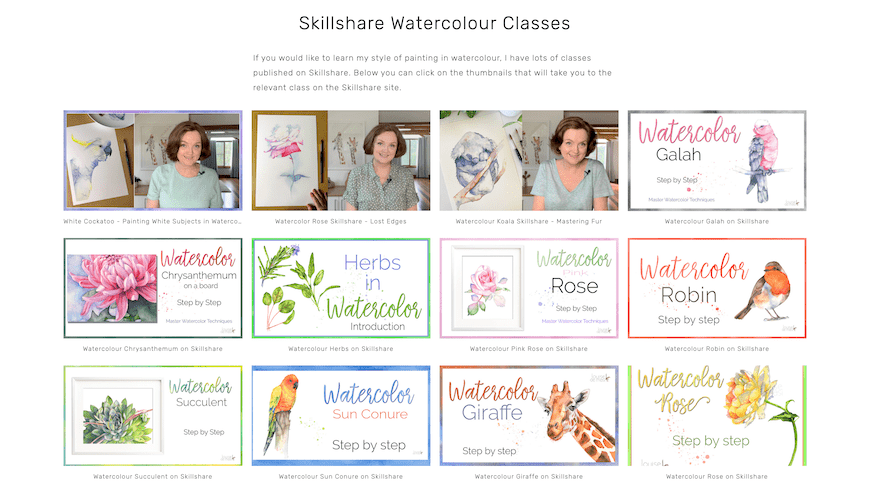
6. Interior/exterior design
During the height of the COVID-19 pandemic, people were spending a lot more time at home, which in turn led to a boom in DIY projects involving the house. While movement is fortunately far less restricted for most these days, the interest in DIY remains high.
If you have a passion for designing or decorating, creating a course on this topic may be a profitable avenue for you. This kind of course could involve anything from interior design, home improvement, and feng shui to gardening, landscaping, and more. You could even create a course teaching people how to declutter their homes or offices and help de-stress their living environments.
Kristen Forgione, founder and principal designer of interior design company THELIFESTYLEDCO, has created Organic Desert Learning, a collection of digital courses designed to teach customers various styling techniques for their homes.

7. Photography and videography
Perhaps you’re a professional photographer who’s spent the last few years photographing wildlife all around the world. Or maybe you’ve recently taken photography up as a hobby and simply enjoy taking pictures of your friends and family during special events. Either way, help others explore their creativity by launching an online course teaching photo or video skills.
Courses on photography or videography can involve a vast array of topics, including equipment, lighting, types of photography/videography, editing techniques and software, backgrounds, and much more.
With the rise in social media usage and desire to become an influencer, an increasing number of people are learning how to take photos using their smartphones. If you’re adept in mobile photography yourself, you might consider selling a course like Lisa Carney’s Master Mobile Photography Bootcamp course available on CreativeLive to take advantage of this trend.
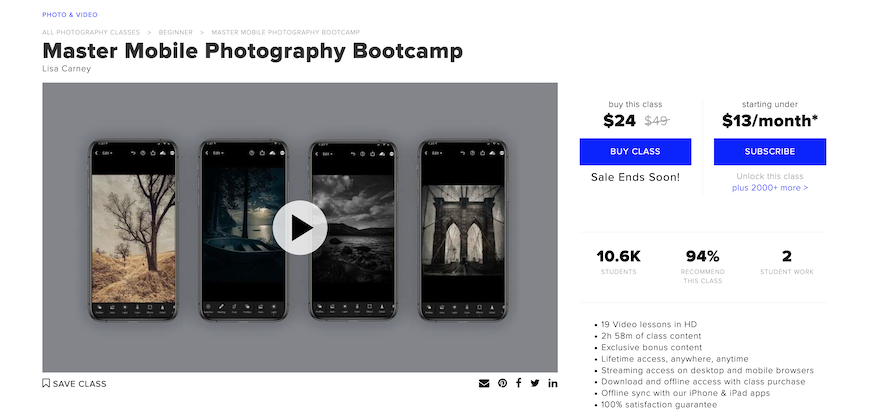
8. Beauty
The beauty universe offers a plethora of possibilities for courses to teach online: from hair and makeup tutorials to courses on nail art, special effects makeup, skincare, tattoo art, and more!
If you’re a hairstylist or makeup artist who already has a decent following on social media, you’ll likely have a built-in audience willing to pay for a course you create with content that’s more in depth than what’s in your videos on Instagram or YouTube, for example.
Note that this is a course topic that works really well in a video format, so you’ll want to be sure to invest in the best equipment you can afford to ensure high-quality content.
If you’re interested in creating courses involving beauty and/or personal care, consider exploring a variety of topics, maybe even offering content that concerns smaller niches. For instance, Nikki van Gend’s Colour Theory for Permanent Makeup course on Udemy teaches makeup artists and technicians how to understand and apply the principles of color theory to ensure the best results when providing their clients with different types of permanent makeup.
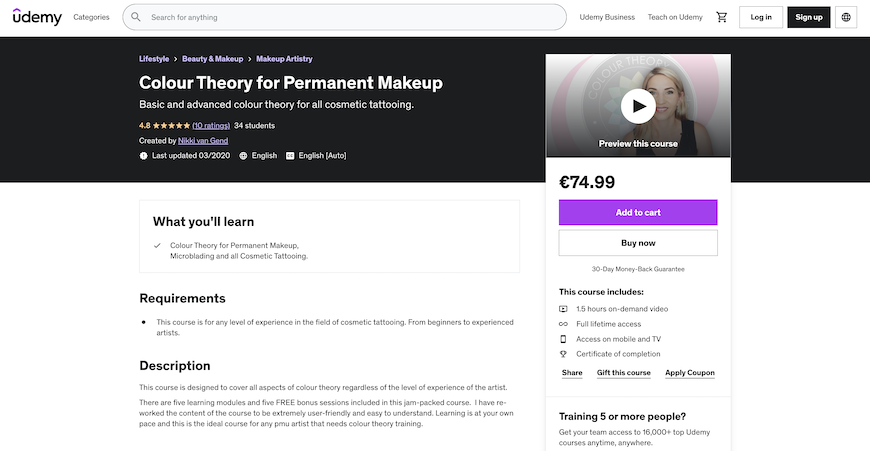
9. Health and wellness
The “health and wellness” category certainly includes fitness, mentioned earlier as one of the best-selling course topics, but it’s so much more. Today, there’s a greater understanding of the need to focus on not just physical health but mental and emotional health as well.
This is another area that was further highlighted during the pandemic, with lockdowns and global uncertainty causing many people to experience new levels of stress, anxiety, loneliness, and depression.
Besides fitness, health and wellness courses will often overlap with other categories, such as cooking, if you opt to, for instance, teach recipes incorporating foods to help balance the nervous system. Additional topics in this category can include meditation, mindfulness, journaling, massage therapy, mental health in the workplace, and many others.
MindBodyGreen is a website that offers resources pertaining to various aspects of wellbeing. Site visitors can also find a “Classes” section, featuring numerous courses, such as The Essential Guide to Meditation, that can be purchased individually or accessed via a one-time lifetime subscription fee.
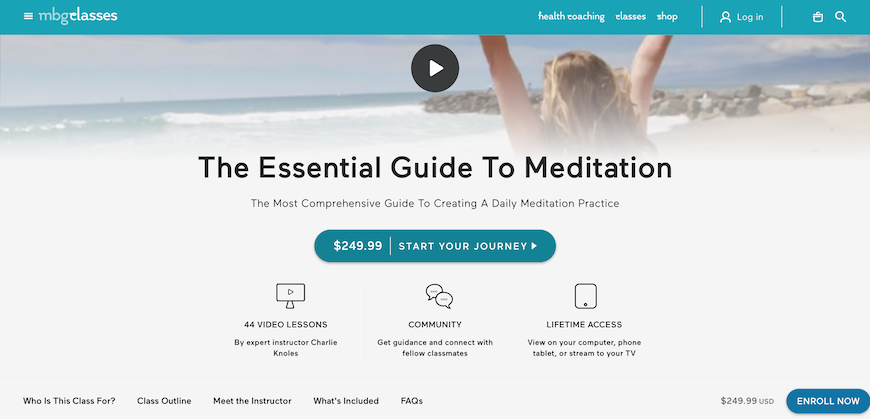
10. Writing
Regardless of the industry, writing is a valuable professional skill to master. Many people also enjoy writing as a hobby, scrawling poems, short stories, or novels, for example. For these reasons, writing is an excellent topic when it comes to online courses to sell.
With this subject, it’ll be especially important that you select the right niche. Instead of creating a course on a rather broad topic like “How to Write a Poem,” for example, try to focus on a specific type of poetry or facet of writing that would help aspiring poets learn to write better poetry. In addition, save yourself the work of having to constantly update your course by picking an evergreen topic that people are likely to remain interested in for the foreseeable future.
Whether you are a published author, have other professional writing experience, or simply have lots of knowledge about writing due to the screenwriting you do on the side for fun, online courses involving the written word have the potential to attract a wide audience.
In the example below, author Neil Gaiman teaches a storytelling course on the MasterClass platform. Fans of the writer will no doubt appreciate being able to learn all about his storytelling techniques and tips on creating captivating works of fiction.
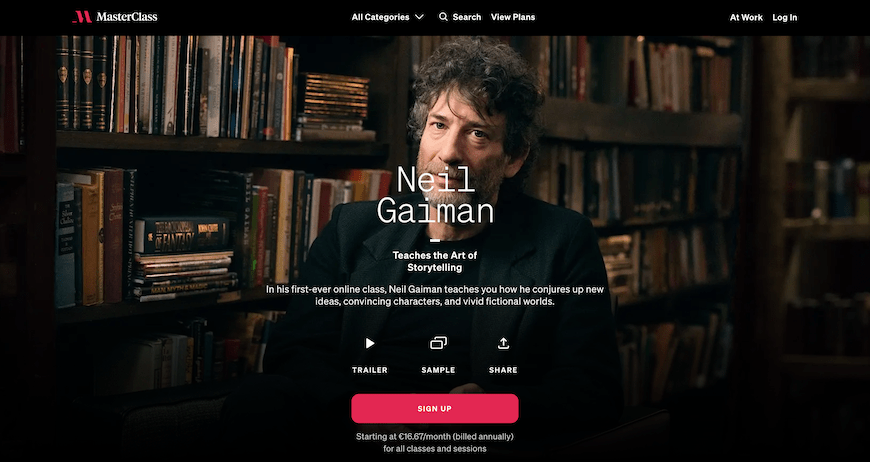
11. Business and management
With the increase in people wanting to launch their own businesses and the growing number of new careers being created thanks to advancements in technology, the demand for courses in business and management is booming.
Spanning a wide range of topics, including entrepreneurship, project management, diversity and inclusion in the workplace, start-up launching, international expansion, freelancing, ecommerce, dropshipping, growth strategies, time management, finance, and more, the business and management category allows you to create courses appealing to all kinds of niches.
For instance, Tara McMullin’s Build a Stand-Out Business class, available on CreativeLive, teaches students how to create a business that aligns with their unique voice and values, one that stands out from the competition.
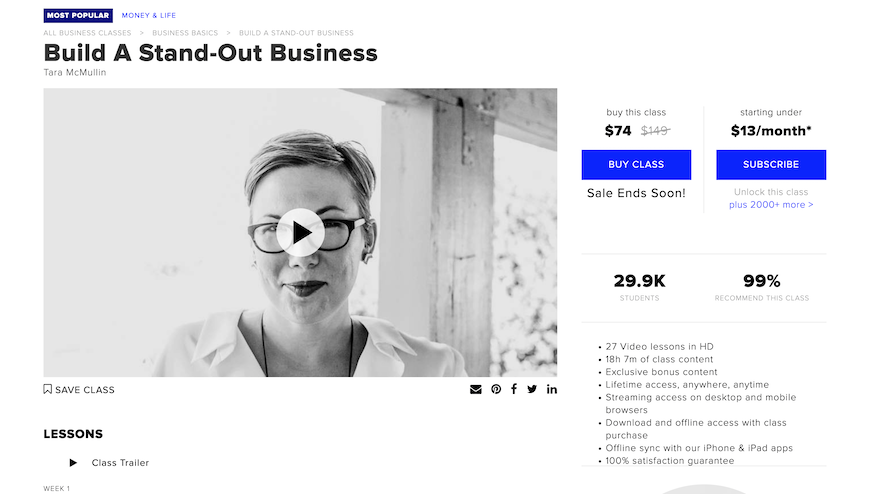
12. Fashion
Do you love putting together outfits for any occasion? Helping other people decide what to wear? Making your own clothing? If you’re fascinated with anything related to fashion and style, launching your own online course in this category could prove to be quite profitable for you!
With a global appreciation for fashion, regardless of your chosen topic, there’s a very good chance that you’ll have an audience excited to purchase your course. Here are some possible themes to consider:
- assisting people with developing their personal style,
- showing shoppers how to find the best vintage clothing,
- explaining how to shop sustainably,
- revealing helpful clothing hacks, and
- demonstrating how to get started in fashion design.
As is often the case, fashion courses can fall into some of the other best-selling course categories in this list as well. For instance, Nino Via’s beginner’s course in Sketching for Fashion Design on Udemy combines fashion with art, showing aspiring designers how to transfer their ideas to paper.
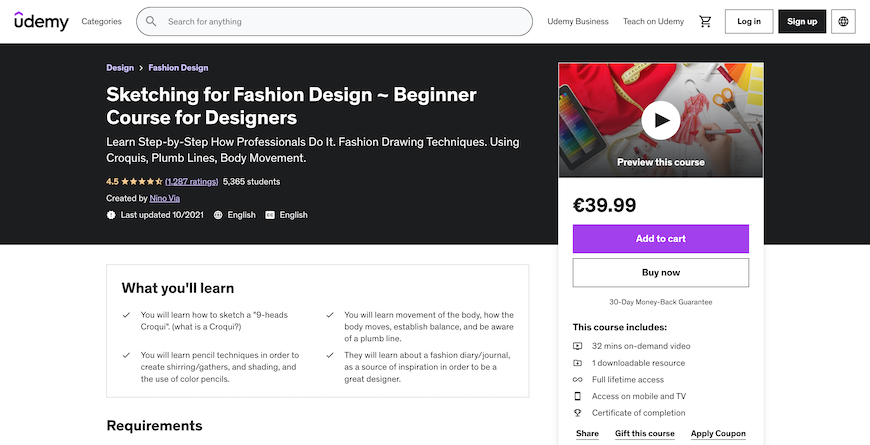
13. Information technology and software
Every year, there seems to be a growing number of advancements in technology. While these advancements generally bring a whole host of benefits, it can be challenging to keep up with them, especially for those who are less technologically gifted.
What’s more, although technological updates have always been around, they’re likely to continue increasing into the future. If you’ve got a mind for technology and enjoy helping others learn, consider making courses to aid people with feeling more at ease and confident with everything from cyber security and website development to user experience, coding, artificial intelligence, augmented reality, and more.
StationX offers an extensive library of courses concerning cybersecurity, allowing customers to bundle courses or purchase the All Access VIP Membership for lifetime access to all content.

14. Foreign languages
As companies become increasingly international and more individuals take advantage of the ability to work remotely, the interest in learning foreign languages is expected to rise as well. With this type of course, no formal training is necessary—you’ll just need to be proficient in the language you plan on teaching.
Note that you’ll have plenty of room to explore various aspects of the language and offer modules that each focus on a different topic. Say that you want to teach Spanish. You could offer courses on “Spanish for Tourists,” “Spanish for Business,” “Spanish for Beginners,” “Spanish for Advanced Learners,” “Spanish Slang,” “Spanish Cinema,” etc.
As learning a new language comes with challenges not found with other learning subjects or skills, it’s advantageous to create a wide variety of types of content to appeal to different learning styles. Incorporate listening, speaking, reading, and writing into your modules to ensure a well-rounded approach for students.
Portuguese with Carla’s The Journey course takes a rather creative approach to language learning. Learners follow the story of Carla and her journey unraveling a family mystery. Course subscribers have access to 80+ video lessons covering different aspects of the Portuguese language, quizzes, assignments, and more.

15. Professional skills
People look to improve their skills in the workplace for various reasons—to obtain a higher position, earn a larger salary, or switch to an entirely new field. Furthermore, online courses teaching professional skills provide workers with the added convenience of being able to follow the training whenever they’d like rather than having to try to fit it into their workday.
If you’re an expert in a particularly in-demand skill that can help people further their careers, this could be an ideal niche for you in terms of online course creation.
Don’t forget that professional skills can encompass many different abilities, depending on your target market, and they may very well fit into other course categories in this list too. In addition, they can include “hard” skills, which include knowledge related to the job and abilities needed for the person to be able to complete their duties effectively, and “soft” skills, which are the personal qualities that can help the employee as well as the work environment flourish.
Here are some of the professional skills in demand across many industries today:
- public speaking,
- business communication,
- time management,
- team leadership,
- data analysis,
- cloud computing,
- artificial intelligence and machine learning, and
- software and application development.
A great example of a professional skills course that combines several niches simultaneously can be found in FutureLearn’s Statistics and Data Analysis in Excel training.

What will you teach in your online course?
As you can see, the choices abound when it comes to topics for an online course…it’s up to you to determine what niche will allow you to make the most of your knowledge and passion while appealing to the right audience in order for your course to be profitable.
Remember that many online courses don’t require the creator to have formal training, though it can certainly help to boost customer trust in some cases. Whatever niche you decide to explore with your e-learning business, creating high-quality content on a top online course platform is key.
With the WiziShop ecommerce solution, online store owners now have the ability to sell digital products like online courses in addition to physical goods. Once you’ve decided what you’d like to teach, be sure to check out WiziShop and enjoy a 7-day free trial to see just how amazing the platform will be for your new business!
Try WiziShop free for 7 days
THE EASIEST NO-CODE ECOMMERCE SOLUTION✅ No credit card required
✅ Access to all features
✅ No commitment










